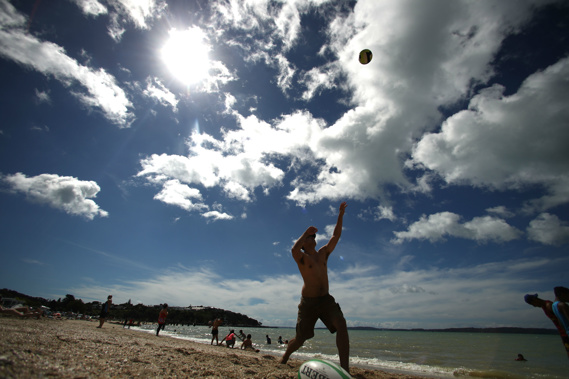
The next 100 years could see Auckland's average temperature increase by 3.75C along with an increase in floods, superstorms, coastal erosion and wildfires.
A Niwa report released today revealed the Auckland region's climate will get hotter and the weather more volatile over the next 100 years.
If global emissions continued on the current path Auckland would have 70 additional days over 25 degrees each year - meaning a quarter of the year would have temperatures above this.
Average temperatures would also increase by up to 3.75C by 2110.
At a presentation of the report this afternoon, Niwa's chief scientist for climate, Sam Dean said while this wouldn't equate to extreme changes to our climate, it would require us to change aspects of our lifestyles and design of the city.
"It is enough that it will require adaptation to cope with."
"Those very short duration heavy rainfall events increase that cause flash flooding. And that presents challenges for infrastructure in responding to that," he said.
Auckland Council's Head of Strategy and Planning at Auckland Emergency Management Craig Glover said climate change would impact us all in some way, shape or form.
"Many of our high priority hazards in Auckland are exacerbated by climate change. Coastal inundation, flooding, superstorms, coastal erosion, land instability rural wildfires and drought ... The list goes on and on."
The 350-page report was commissioned by Auckland Council, Auckland Transport, Watercare and Panuku Development Auckland.
It looks at the impact climate change would have on different environments and sectors within the Auckland Region in terms of water quality and soil changes as well as on our coastal communities and biodiversity through sea-level rises and increased sea surface temperatures.
The report said the health of our oceans was also under threat: ocean temperatures are increasing and ocean pH is decreasing, making our waters more acidic.
The uncertainty around the level of greenhouses gases we could see in our atmosphere was dealt with through consideration of "scenarios" that described concentration of gases.
A "mid-range scenario" looked at what would happen if emissions were to stabilise, while a "business-as-usual scenario"saw emissions continue unabated.
Chief engineer Sarah Sinclair said the key thing was acting now to mitigate changes as they happened.
"It's really important for us to take this opportunity to plan. If we don't plan we will be taking much more reactive actions further down the track."
Take your Radio, Podcasts and Music with you









